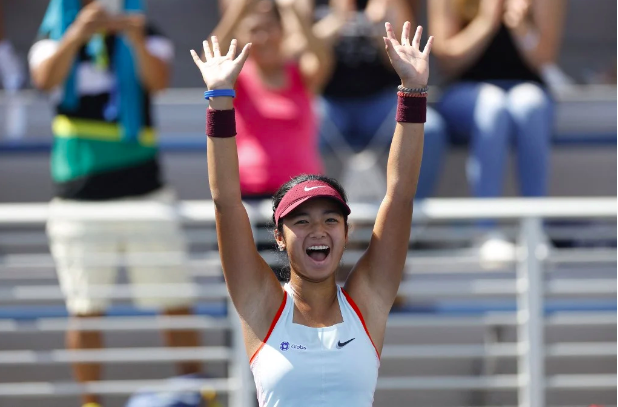
Alex Eala of Philippines celebrates after defeating Lucie Havlickova of Czech Republic during their Junior Girl’s Singles Final match of the 2022 US Open at USTA Billie Jean King National Tennis Center on September 10, 2022 in in New York City. Sarah Stier/Getty Images/AFP
I do research on nationalism and sports, particularly on how Filipinos react online to sports-related events that challenge their notions of nationhood. I started this years ago with research on the half-blood issue that plagued the Philippine Azkals; this year, my research on reactions to Hidilyn Diaz’s declaration that “the West Philippine Sea is ours” is published in Sport and Society.
Examining our articulations of country loyalty is interesting: We’ve been through several colonizers, insist that we appreciate our hundreds of languages while putting English speakers on a pedestal, and argue about what “Pinoy pride” really means. Discussing these ideas online also reveals truths deep in our culture.
In my Azkals research, I found two kinds of Filipino identity invoked online: a static one tied to the place of birth versus a fluid one that can belong to anyone who fights for the country. The first group decries the presence of “half-blooded” Filipino athletes, thinks that “race” is real and can be quantified, and uses this to gauge what constitutes a Filipino. The latter group acknowledges that race is a social construct created by humans to imagine order in diversity, so repeated use of it has contributed to oppression by those who do not fit the mold of “normal.”
In the Hidilyn Diaz paper, I found two groups as well: one that sees politics as a contaminant, so that sports should be protected, and defending the country should be done only if we can win a war; the other sees sports as one among many interacting sectors of society, and patriotism as an innate duty of all Filipinos, so that we must defend our country regardless of our prospects for winning.
It looks like another sports story is ripe for analysis. On Sunday morning, tennis fans stayed up to watch Alex Eala conquer a top-ranking Czech player at the finals of the US Open Juniors. Her win is the country’s first-ever tennis Grand Slam singles title.
What grabbed attention was Eala’s post-match speech. She thanked her family and team, and then dedicated her triumph to the Philippines—in Tagalog, in front of an international crowd, with no dubs, some codeswitching to English, but with passion and tears.
We’ve spent decades pushing out sentences in English on the international stage. Beauty pageants are replete with catchphrases, from the clunky “major-major” to the oft-repeated “the world, the universe rather.” Our local pageants are full of gaffes: who can forget “my roommate, she passed away” and “Oh my gahd my pamilee”?
The push to compete and speak in English is bewildering, given how Latin American countries, the traditional beauty pageant powerhouses, often win without being afraid to call in an interpreter. They seem to acknowledge that beauty is as much in the glamor as it is in one’s cultural identity. Language, then, is part of the package, rather than forcibly replaced.
Eala’s unadorned speech, therefore, was beautiful. Her emotions were deeper, grounded; the words carried meaning that could not be duplicated by mere translation.
“Buong puso ko ’tong ipinaglaban, hindi lang para sa sarili ko, kundi para makatulong din ako sa kinabukasan ng Philippine tennis.”
I fought for this with my whole heart, not just for myself, but also to help build the future of Philippine tennis.
The raw translation is not as weighty as the original.
Ipinaglaban can mean both fighting and defending. There is a dimension of defiance to the root laban. Our ancestors used it to speak out against our colonizers. We used it to speak out against a dictatorship as we marched on our city streets.
Kinabukasan is loaded: It is not merely looking to an unseen, abstract future. It contains the word bukas, signifying both an opening and tomorrow. It is a word that says that tomorrow is no longer uncertain, but it has been opened, new avenues have been forged, new hopes have been awakened.
I’m going to do new research again, this time on how people reacted to Alex Eala’s speech. But, for the moment, it’s enough to revel in her win, and how Tagalog was heard throughout the world.
That’s the beauty of speaking in a mother tongue: It’s not merely about showcasing a language but sharing the reality that we, the speakers, experience. It is sharing a spirit that transcends words.
iponcedeleon@ateneo.edu

